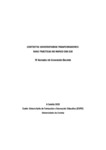Mostrar o rexistro simple do ítem
Coordinated combination of methodologies as the key to success in the teaching of very heterogeneous groups
| dc.contributor.author | Martínez-Díaz, Margarita | |
| dc.contributor.author | Vázquez-Gonzalez, Ana | |
| dc.contributor.author | Servia, María J. | |
| dc.date.accessioned | 2024-07-08T15:51:23Z | |
| dc.date.available | 2024-07-08T15:51:23Z | |
| dc.date.issued | 2020 | |
| dc.identifier.citation | Martínez-Díaz, M., Vázquez González, A. M., & Servia, M. J. (2020). Coordinated combination of methodologies as the key to success in the teaching of very heterogeneous groups. En E. d. l. Torre Fernández (ed.), Contextos universitarios tranformadores: boas prácticas no marco dos GID, p. 567-570. https://doi.org/10.17979/spudc.9788497497756 | es_ES |
| dc.identifier.isbn | 9788497497756 | |
| dc.identifier.uri | http://hdl.handle.net/2183/37802 | |
| dc.description.abstract | [Abstract:] The International Master in Water Engineering is a Joint Degree offered by the University of A Coruña and the Hochschule Magdeburg-Stendal, which counts with the collaboration of other prestigious international higher education institutions. This context, together with the prestige of its lecturers and the high rates of employability of its graduates, has attracted the interest of students from all over the world and with different educational backgrounds. This success is a source of pride, but also a challenge for the lecturers, who must ensure that very different student profiles acquire the same high quality knowledge (Cohen et al., 1997). The solution chosen by the three lecturers of the subject “Water Treatment and Energy Efficiency”, whose profile is also different, consists of a combination of multiple teaching methodologies that has been carried out in a coordinated and conscious way (Kolesnikova, 2016). There are some initial classes on cultural integration, the difficulty of the topics is progressively increased, these and the lecturers are orderly alternated during the term and both the work in changing small groups and activities inviting students to speak in public are promoted. It is also worth noting the large number of practical lessons in the class (problem resolution), in the laboratory (experiments) and in the field (e.g. sample collection), the numerous practical trips and the involvement in companies of the sector. Following these guidelines, an attendance level of almost 100% as well as very good academic results are achieved. In addition, feedback about the subject and the used methodologies is collected at the end of each term from students and lecturers at both institutions. All these data are the inputs of a self-evaluation model of the teaching quality, which allows the lecturers to detect options/needs for improvement. | es_ES |
| dc.language.iso | eng | es_ES |
| dc.publisher | Universidade da Coruña. Servizo de publicacións | es_ES |
| dc.relation.uri | http://hdl.handle.net/2183/25074 | es_ES |
| dc.rights | Atribución-NoComercial-CompartirIgual 3.0 España | es_ES |
| dc.rights.uri | http://creativecommons.org/licenses/by-nc-sa/3.0/es/ | * |
| dc.subject | International teaching | es_ES |
| dc.subject | Heterogeneous groups | es_ES |
| dc.subject | Teaching adaptation | es_ES |
| dc.subject | Methodological combination | es_ES |
| dc.subject | Self-evaluation | es_ES |
| dc.title | Coordinated combination of methodologies as the key to success in the teaching of very heterogeneous groups | es_ES |
| dc.type | info:eu-repo/semantics/conferenceObject | es_ES |
| dc.rights.access | info:eu-repo/semantics/openAccess | es_ES |
| UDC.startPage | 567 | es_ES |
| UDC.endPage | 570 | es_ES |
| dc.identifier.doi | 10.17979/spudc.9788497497756 | |
| UDC.conferenceTitle | Contextos universitarios transformadores: boas prácticas no marco dos GID. IV Xornadas de Innovación Docente | es_ES |






